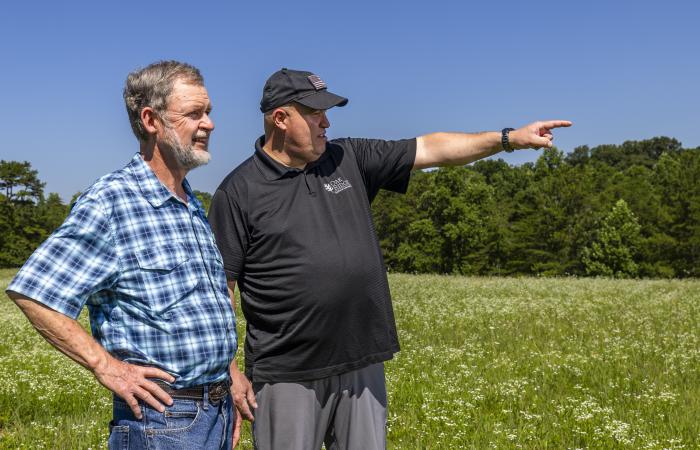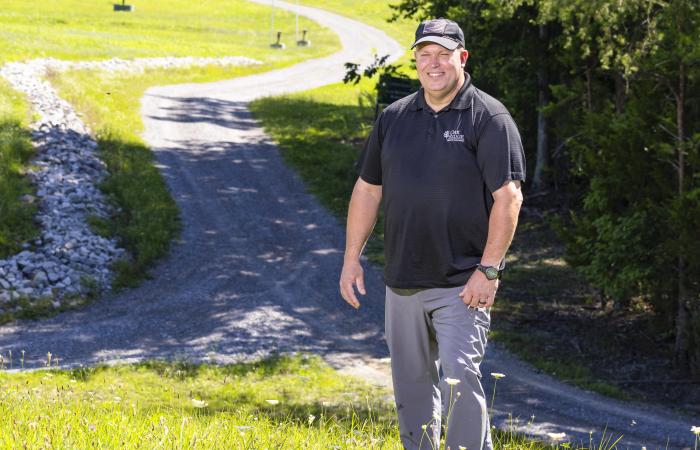Carl Dukes uses self-taught people skills to solve national security problems
Carl Dukes’ career as an adept communicator got off to a slow start: He was about 5 years old when he spoke for the first time. “I’ve been making up for lost time ever since,” joked Dukes, a technical professional at the Department of Energy’s Oak Ridge National Laboratory.
During his 28 years at the lab, Dukes has put his networking skills to good use, organizing human subject research and projects with dozens of participants from diverse backgrounds. Working in the Energy Sciences and Technology Directorate, he plays key roles in national and international security projects, from biometrics to the world’s largest fusion experiment. The hallmark of his work is bringing people together and building trust to solve security challenges.
When Dukes finally found his voice as a child, he grappled with a speech impediment that led many people to assume he had a mental disability.
Far from it. However, human interaction did not come naturally. “I was almost like a robot,” Dukes said.
So, he studied people like an academic subject, analyzing how they spoke, their body language and how they told stories. “I watched people all the time. I had to practice it until I got it. For instance, I never used to move my hands when I talked,” he recalled with a sweeping gesture. “I taught myself that.”
This all might be hard for his colleagues to imagine because today Dukes is known for his extraordinary people skills.
His gentle East Tennessee lilt gives a clue to his origins in the small town of Soddy-Daisy near Chattanooga. After high school, Dukes followed family tradition by enlisting in the armed forces.
Dukes chose to work on ballistic missile submarines in the Navy, partly because he knew he’d have three-month duty breaks to pursue his education. He earned certifications as a nuclear machinist mate, a diesel mechanic and a heating and air conditioning specialist. “I took more training than anybody I’ve ever known,” Dukes said. That led to increased responsibility and the job of engine room supervisor on a succession of two nuclear submarines.
Following six years of military service and one year in the private sector, Dukes was hired at ORNL as a cyclotron operator at the Holifield Radioactive Ion Beam Facility, which produced beams of short-lived radioactive isotopes for research in nuclear physics and astrophysics. Eventually Dukes became a technician designing systems to enhance operations.
After a decade, Dukes shifted his focus to sensors, controls and software, making contributions in nuclear and mechanical engineering, cyber-physical security and biometrics. Today as a member of the RF and Intelligent Systems group, Dukes applies skills from his master’s degree in information security to develop software interfaces and deception technology, diverting cyber criminals away from important data and servers. His diverse skill set allows him to keep his hand in many types of projects.
Do not accept the no
Beyond these technical skills, Dukes has gained recognition for fostering cooperation among people with diverse, even apparently opposing, interests to accomplish big projects despite high security hurdles.
When Dukes sought permission to bring armored vehicles to ORNL to study how to extend their operational life, ORNL decisionmakers couldn’t get over the gun on top — even though it would be removed before arrival. Repeatedly, their response was no. Dukes visited each person whose approval he needed, answering their individual questions and concerns.
“I said, ‘The answer could be yes. It will help our soldiers. We don’t want their equipment breaking down in a hostile environment when they are being shot at.’” After repeated attempts, he won them over. ORNL experts updated the vehicle’s operating and maintenance approaches. “We did a lot of good and even saved lives,” Dukes said.
In 2021, Dukes served as health and safety lead for the image collection event of the Biometric Recognition and Identification at Altitude and Range study, or BRIAR. To fight terrorism and protect critical infrastructure, the BRIAR project trains artificial intelligence software to recognize people based on their physical features and movements. To obtain images for training the algorithm, cameras photographed hundreds of citizen volunteers from different angles and distances.
The first collection occurred in a field inside the ORNL gates. Those responsible for the site were concerned about access and safety. Dukes built their trust by educating himself thoroughly about the space and the sensitivities, then worked his way up the approval chain. Again, the answer was no.
Dukes wasn’t perturbed. “I respect the no,” he said. “I do not accept the no. Maybe the answer is not no, but instead maybe if we make certain changes, we can compromise and work it out.”
Dukes collaborated with internal departments such as security, fire, legal, medical and the Oak Ridge Reservation cleanup contractor to establish evacuation routes, access for the citizen volunteers, security plans, medical and COVID-19 mitigation protocols, and emergency vehicle paths. He coordinated with more than 90 people, from vendors to integral ORNL personnel including a bat expert.
A culture of valuing different viewpoints
A specialist in human subject studies, Dukes recently helped evaluate lie detection technology. To do so, his team designed, validated and carried out a complex series of system tests. He helped train staff to carefully orchestrate the experiment. He encouraged the testing design team to voice contradictory perspectives.
“In human subject work, you have to account for the unexpected. In a script, a word that means one thing in Tennessee may not mean exactly the same where that person is from,” Dukes said. “Your team is your best asset because it’s made up of people from different cultures and backgrounds. It’s very important to listen to everyone, because when one person offers a different point of view from everyone else, that’s so valuable.”
Dukes’ ability to connect with people from different cultures helped him negotiate a contract among the U.S., Japan and Italy to obtain a special component needed for ITER Electron Cyclotron Heating, or ECH, testing in Japan. ITER is an international collaboration to create the world’s largest fusion reactor. Dukes’ experience at the Holifield cyclotron particle accelerator laid the groundwork for his leadership of a team testing ECH components and providing design recommendations. Dukes and his team recently returned from successful component testing in Switzerland.
Despite his many successes, Dukes says his early struggles with communication and acceptance made him predisposed to imposter syndrome, believing that his skills were not enough to have earned his success. “In some ways, it kept me humble,” he said. “I’m very mission-oriented. What’s kept me here are the people and projects I care about, things that help our country. Bottom line is that I believe in my projects and the people I work with.”




